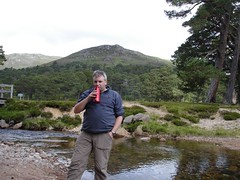From 13th November 2007:
The National Union for Journalists (NUJ) has admitted its first full-time freelance professional blogger as a member.
Conrad Quilty-Harper, who blogs for technology blog Engadget, had his application for membership approved at a meeting of the NUJ’s London Freelance branch last night, Tim Gopsill, editor of The Journalist, confirmed to Journalism.co.uk.
Harper was invited to attend the freelance meeting where his application was passed after he was initially rejected by the union for being a student on a non-media course.
And earlier, on the 25th October 2007:
Guardian media blogger and former Daily Mirror editor Roy Greenslade is quitting the National Union of Journalists (NUJ), because of the organisation's attitude towards new media.
Greenslade, who has been a member of the union for 42 years, announced his resignation on his blog and said it would be 'hypocritical' to remain a NUJ member 'when I am now so opposed to the union's central aims'.
In his post Greenslade said the group's policies needed to be updated to accommodate the growth of online journalism: "Journalistic skills are not entirely wiped out in an online world, but…they cannot be confined any longer to an exclusive élite group."
Explaining his decision Greenslade suggested that while the NUJ sees the internet as a threat to journalism 'it [the web] is much more a threat to the union itself.'
"[T]he union, as with the print unions of old, cannot possibly adapt to meet the revolutionary demands of a new technology," his blog post said.
Interesting times indeed. Anyone fancy a Diet of Worms? In the same way that professional photographers have been affected by sites like Flickr, cheap dSLRs and people willing to put the time and effort in to try and improve their skills, then journalism must also be affected. It comes to reason, that as news becomes more speculative, exclusives are not exclusives, the tv news complains when people rebroadcast their feeds but happily show YouTube videos without stating that they have the owner's permission. What really separates the paid journalist from the citizen journalist? Time, effort, money, resources, skills in obtaining the news, a talent for language. Some have skills and talent, others one or the other - just like in any job. Is every citizen a journalist? No. Is everyone who owns a camera a photographer? No. In days past, eyewitnesses to events would only be able to describe the event, now they have videos and still photos, some have been keeping blogs instead of written diaries.
In a knowledge-lead society, do we need to be able to distinguish between facts and opinions. Is a review in a magazine opinion or fact? Are comments left about a piece of software factual or trite nonsense left by a competitor? Only the knowledgeable reader can judge. But where do they learn that judgement from? No-one seems to be teaching online citizenship these days.
"First they ignore you, then they laugh at you, then they fight you, then you win." Mahatma Gandhi (source)
Are bloggers looking for a fight? I amn't. What is victory? I don't know. Anyone can use the same quote when they feel that they are being oppressed. Do I feel that bloggers are being oppressed? Wise up. Blogs are merely a medium. The person behind the computer is the important cog in the Web2.0 wheel. In our own mind, we are important. We are important to our families and friends. We matter. Does what we have to say about the world matter? Probably not. But we are social animals, we have brains and can think. So why not use the tools available to us to be sociable, to think and to converse. Geography, social class, skin colour, cultural background, age, gender, physical abilities and religion are less important than your ability to be a sentient human being. If you refuse to think, to reason, to discuss, to create, then you are an empty shell of a being.
Maybe that is what scares some in the media? A lot is just boring, brainless drivel, re-hashing old news, cutting back on investing in investigative journalism, and making decent programmes for television. If there is only so much happening in the world, but news has to be available 24 hours a day, 7 days a week, why can't there be more detailed, in-depth news? Maybe because we, the recipient, have no time for it? In the Information Age, there is a growing divide - the news reflects this. There are just too many channels for their to be a good standard of quality programmes. Will this change in the future? I don't know, but can guess that there will be an increase in the number of niche channels.
For the record, my main sources of news are: BBC News website, Radio 4's Today programme, Radio 4 news (especially midnight), Newsnight, Channel 4 news.





No comments:
Post a Comment